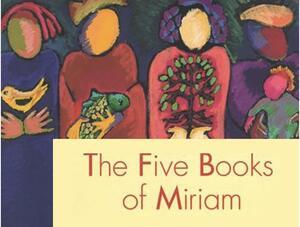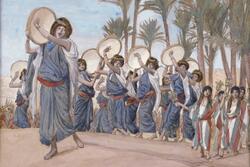The Five Books of Miriam
A few years ago, as a first-year undergraduate, I found myself tethered to campus. Without a car, my weekends were primarily spent in my dormitory lounge, dog-earing textbooks for class and burning through Netflix documentaries. I was, to put it mildly, incredibly bored. I didn’t have a clear sense of identity, and thus eventually found my way to the undergraduate library. In retrospect, I am incredibly grateful to my past self for burrowing so deeply into books. I burned through the list of classics I had kept since high school and quickly moved onto contemporary fiction.
One quiet Sunday afternoon, I found myself in the Judaica section, figuring I was long overdue to delve deeper into my Jewish history. I was disappointed by the selection—mostly Torah translations and a few Holocaust memoirs. One title stood out to me: something called The Five Books of Miriam. Originally published in 1996, Ellen Frankel’s book bills itself as a “woman’s commentary on the Torah”—decidedly feminist, at least from the title. I grabbed it without opening it, and carried it under my arm amidst a large stack of promising-looking reads. I liked the idea of having a decidedly Jewish book amongst my stack. In actuality, I flipped through a few pages more than once, each time deciding I would rather push through a novel I could discuss with friends rather than a niche exploration of sacred texts. I eventually returned the book, unread, with a slight twinge of regret.
A few months later, in a bookstore, I stumbled across The Five Books of Miriam for the second time, this time wedged between Audre Lorde’s Zami: A New Spelling of My Name and The Feminine Mystique. I loved the aesthetic of the bookstore’s edition—chunky prints and muted colors, with the kind of font scheme that reminded me of something I’d find on the shelf of a wayward, eccentric aunt. I purchased the book, fully intending to dig in immediately upon returning home. Naturally, it ended up migrating onto my bookshelf, unread, and for three long years, that’s precisely where it remained, gathering dust.
This past year, I returned to my oldest comfort: reading. I made a stern pact with myself to forgo purchasing new books until I had finished those on my bookshelf, and I moved The Five Books of Miriam to the top of the list. I had no expectations of divine revelation going in—as a secular person, I was most interested in reading Torah interpretations unburdened by religious expectation.
To that end, the book effortlessly balances belief with tradition. Though those two concepts often intermingle, it is possible to approach the text from equal places skepticism and faith. Frankel weaves established rabbinical commentary with vivid imaginings of conversation between Judaism’s founding Mothers: Ruth, Sarah, Miriam, and even Lilith (referred to in the text as the rebel). The book is organized by category of interest: sex, marriage, menstruation, High Holidays. This makes it easy to pick and choose what portion to read. To ensure the more minor women mentioned are properly contextualized, Frankel includes a glossary of important players, along with refreshers on stand-out events and legends alike.
I was intensely curious about the menstruation laws, as I firmly believed (and still do) that they are wildly sexist—even with the broadest “modern” interpretation. I was pleased to see that the book did not attempt to perform mental gymnastics to justify exclusionary practices. Instead, the voices of the Women—Lilith in particular—argued with each other on the page, just as one might find rabbis doing in the Talmud. Still, Frankel did not ignore the more conservative viewpoints available. On this topic, for example, she writes that the sages in our time (meaning imagined modern scholars) argue “Nonetheless, the laws of niddah have remained a central part of traditional Jewish observance …we discover that they (laws declaring separation during menstruation) are all motivated by a fear of menstruation’s uncanniness … How can a woman bleed every month yet remain healthy?”
Frankel designed the book to progress through the five books of Moses, just as one would normally move through the calendar of synagogue readings. I found I enjoyed the readings most when I experienced them in smaller sections, much like a week-by-week reading in temple. Treating The Five Books of Miriam as a quasi-devotional forced to me to put aside time each week to sit quietly and read. Regardless of religious takeaways, I found myself looking forward to the period of time I dedicated to this practice. All books can be meditative, of course—but I found Miriam to be particularly suited for this purpose.
At the root of The Five Books of Miriam is our great cultural urge as Jewish people—a desire to question, to be in a constant dialogue with God, with ourselves, and with each other. Each Passover, at my own holiday table, we read a set of questions rewritten by a feminist collective in New Mexico, which go as follows: “Who are our mothers? Who are our ancestors? What is our history?” We pause and reflect, before reading in unison, “The one who knows not how to question—she has no past, she has no present, she can have no future without knowing her history, without knowing her angers, without knowing her questions.” The Five Books of Miriam is not a book of answers—but then again, neither is the Torah.
Though breaking the book into sections meant it took me the better part of three months to formally finish it, I am so grateful I finally decided to make Miriam a priority. Reading it, I’ve discovered meaningful content and practice. A discovery that’s better late than never.








I would love to be able to do a discussion of this book. Is there a discussion guide or something?